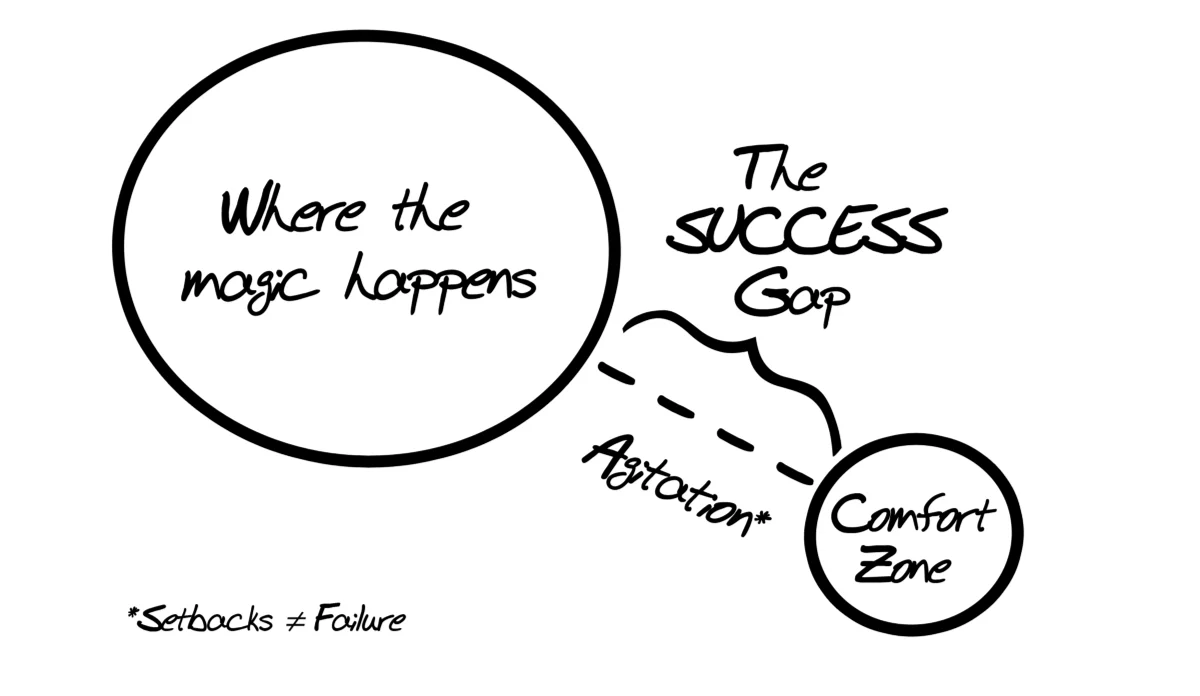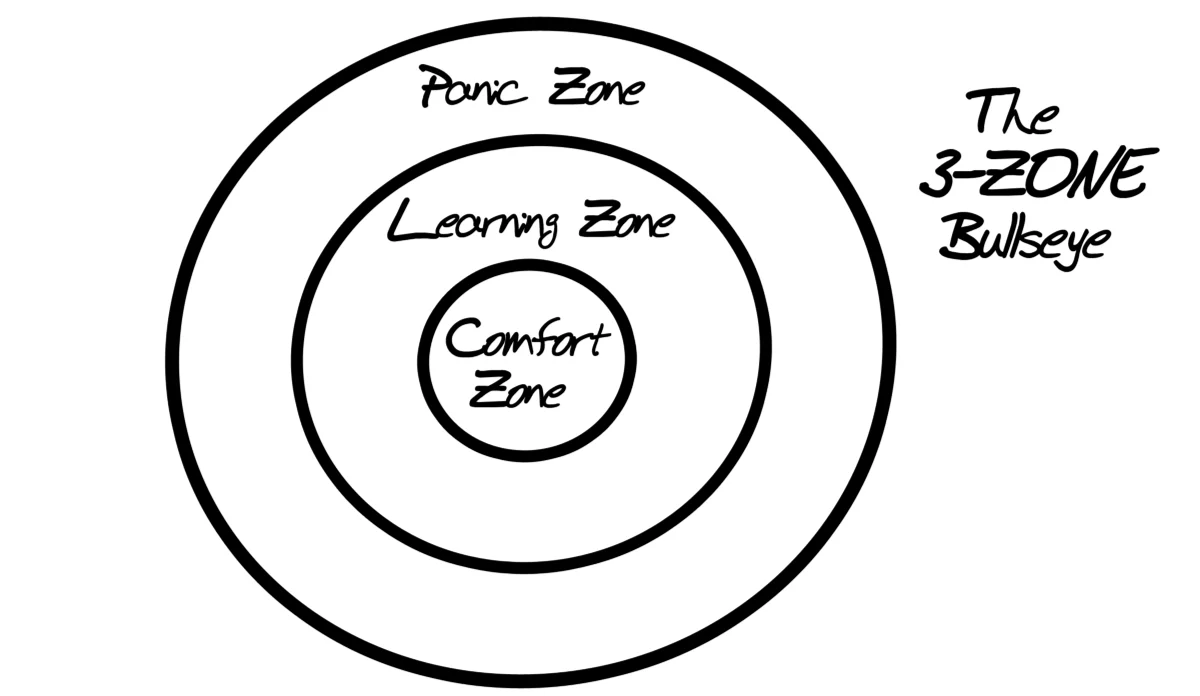
Do You Know What Your Natural Management Style Is?

The Best 25 Zinger Life Quotes For Ambitious People
Eliminate the success gap between talent and opportunity by pulling yourself out of your comfort zone instead of shying away from challenging situations.
“If you’re going through hell, keep going.”
When was the last time you pushed yourself to do something you truly didn’t feel like doing? Take a second and think about it. Can you remember the moment you decided to take action and just go for it? Odds are it wasn’t an avoidable task.
“Honestly, I just met you and I don’t think I like where this is going.”
As the cliché would have it, it was a rainy spring morning in Istanbul. Gray clouds were hanging low over the office. It was only fitting that there was a storm gathering strength at the other end of the conference table as well.
To say he was agitated would be an understatement. I should know, I’ve been told I agitate people for a living.
But before we get to that, I need to point out a simple truth: I love success. Success is great. If I had to pick between success and failure, I would pick success every time. We all would.
And yet, only a select few of us can genuinely say that they have achieved the level of success that they strive for.
There are many reasons why this is so. Countless books and articles have been written on this subject. You have seen the motivational quotes. Encouraging you to break out of your daily routine. To go ahead and do something you wouldn’t normally do. To take risks, to take chances, because life is nothing but one big adventure.
It sounds enticing; it seems so simple. But the reality is it’s not. Quite to the contrary, it takes serious work and effort. Perhaps not surprisingly, there is a lot of science that explains why it is so hard to break stale old habits. And why it is good for you when you do it.
As with most things in life, triumph — no matter how big or small — looks a lot more appealing to the casual observer from a distance. The closer you get, the quicker the magic evaporates. The reason: To win in life and career, you need to figure out what works and fix what doesn’t.
Put another way, making mistakes is a crucial part of the process.
Except, no one in their right mind likes to make mistakes as they tend to be painful, stressful, and — more often than not — costly and embarrassing.
Thus, when left to our own devices, we are all unwitting prisoners inside a prison of our own design.
You may have heard of it, it’s called your “comfort zone”.
What’s most interesting is that while most of us will agree that our respective comfort zones are the proverbial dead zone of individual progress, few will venture to make any meaningful effort to break free.
No need to feel bad. It’s not your fault, its basic human nature. Which is why dedication and motivation alone will only get you so far in your quest to conquer millions of years of evolution.
Real progress requires pain and reflection. The sooner you accept and learn to deal with this reality, the better off you will be in the long run.

It’s agitating, it’s unpleasant and it’s positively unavoidable since it is an invariable law of nature that to grow you have to push your limits and learn to manage the pain in order to make any kind of decisive progress.
Which is, believe it or not, great news if you have goals. Here’s why, broken down into seven pivotal reasons:
Reason #1: Anxiety Is A Biochemical Sledgehammer
The process of evolution has programmed us to function in habitual ways. Letting go of these habits is far from comfortable and may trigger biochemical changes that cause anxiety and fear of failure, rejection, or criticism.
To avoid these painful feelings and experiences, each one of us has adopted a set of primary beliefs and responses early on in childhood (i.e. being nice, fitting in, taking it slow, playing it safe, not screwing up, etc.).
While these subconscious patterns and defenses are meant to be a positive force in your life by helping you feel comfortable and free of anxiety, they do end up keeping the primary underlying fear alive and burning. The unfortunate end result is that these defensive behaviors manifest themselves as deep-rooted habits that become fixed facets of your personality.
For many, even thinking about breaking out of these patterns will trigger intense anxiety over the agitating consequences of pushing the envelope.
The good news is anxiety is something that we need to succeed.
When handled correctly, it can be a powerful and constructive productivity tool, helping you tear down mental walls and clear your path to success like a sledgehammer-wielding superhero (good looks and thunder sold separately).
On the other hand, when handled recklessly and without care, anxiety is prone to turn on you like an out-of-control wrecking ball, bringing about painful consequences that can be quite dangerous and destructive.
The key is to understand that anxiety is an essential helper that requires special handling and time and effort to master. In itself, a sledgehammer is neither good nor bad, because how you use it makes all the difference. Ideally, you want to stretch first, warm up and avoid busting your conk when you start swinging for the fences.
Reason #2: Security Is A Perverse Illusion
Whether we like to admit it or not, we all crave safety and security. For some of us, it’s fear of failure and for some it’s fear of success that makes us reluctant to change. Either way, when given the opportunity, most of us will avoid uncertainty by sticking with what feels safe and familiar.
This natural discomfort with the realm of the new and unknown — be it rooted in failure or success — is another legacy of our primal survival instincts. The painful fact is that uncertainty is a constant part of life and there’s no avoiding it. The best we can hope for is to learn how to cope with it.
Fortunately, it’s easy to do if you’re willing to keep an open mind. Athletes do it. Children do it. Odds are some of your friends do it.
And while I’m not a proponent of superstition, I do agree with Dr. Kevin Foster, professor of evolutionary biology at the University of Oxford, that being superstitious makes sense in an uncertain world.
If nothing else, it will give you the illusion of control, which many times can mean the difference between success and failure.
Helen Keller said it best in her book “The Open Door”: “Security is mostly a superstition. It does not exist in nature, nor do the children of men as a whole experience it. Avoiding danger is no safer in the long run than outright exposure. Life is either a daring adventure, or nothing.”
What it all comes down to is this: There’s no security, there’s only opportunity. Your focus has to be to stop worrying and start learning how to handle uncertainty, because the ability to be at ease with change is one of the most powerful predictors of success in both life and business.
Reason #3: Comfort Is A Serial Killer
The comfort zone is a cozy place where dreams go to die and regrets multiply. Success demands commitment and commitment demands an eagerness to work toward a future result devoid of any guarantee of the desired outcome.
Without the perpetual push-pull of an inner drive and an external catalyst, there is little incentive for you to change and expand your personal boundaries. What’s worse, comfort will trick you into believing that things cannot change, so why bother trying?
The most difficult step is to acknowledge that you have mental and physical abilities beyond your own estimation and that your cognitive biases do not give you an accurate picture of your capabilities. No one is immune to this dissonance, not even heads of state, given that they tend to underestimate their own capabilities and overestimate those of their adversary.
Comfort creates a restrictive domain ruled by fear and “what if” doomsday disaster scenarios tailored to invoke feelings of helplessness and panic whenever certain unfavorable events seem likely to take place. The more you resist or deny these feelings, the more persistent they become.
It’s not a big deal to feel anxious or be fearful until you make it a big deal. Once you have established a specific goal and a strategy for realizing it, you have to only do one thing and one thing only — toss the ball out in front of you and then swim towards it.
This is the concept of change and development. You keep expanding your boundaries of comfort by being receptive to new perspectives, to find new opportunities, and face new challenges.
Once you recognize that there is no sustainable comfort in drifting through life in a passive-reactive mode, change becomes progressively less painful as the odds of living up to your full potential increase exponentially.
Reason #4: Misfortune Is A Present You Can’t Regift
Here’s something you don’t read every day: The key to success is failure.
Intuitively, we all understand that the ability to cope with adversity is critical to our development and to experiencing a productive, successful and happy life. On the other hand, if we had a choice in the matter we would definitely prefer to avoid hardship altogether.
There’s nothing positive to be said about misery and misfortune.
The best we can do is to turn the ordeal into an opportunity for progress and positive change whenever it rears its ugly head.
At the heart of dealing with failure and hardship is focus and concentration. In other words, the ability to take a step back from your emotional responses and to knuckle down on the problem at hand. It means mapping out a game plan toward your objective without feeling overwhelmed by your worries, self-doubts, or fears.
Focus empowers you to deal with life’s realities without shrinking from them.
However, you should focus only on what you can change instead of focusing on what you can’t control. In fact, putting too much emphasis on the outcome can wreck your focus and weaken your determination when the chips are down. And they will be down more times than you will care to count if you are ambitious and goal oriented.
Hence, the next time you are knocked down by a crushing defeat or a career-threatening setback; remind yourself that adversity is imperative to becoming a champion. As long as you can get back up again, it’s okay to feel defeated, because in the long run, those negative emotions will boost your determination and strengthen your resolve to make it past the finish line.
Reason #5: Power Is A Personality Trait
No one will disagree that life has become all competition all the time. Hard work alone is no longer enough in an increasingly hypercompetitive world. You can’t just be good, you have to be great. You can’t just be smart, you have to be brilliant. You can’t just be prepared, you have to be perfect.
If that’s you, great, good luck keeping up in that rat race. I for one am none of those things and the way I see it, that’s my biggest asset.
We are living in a society that worships power — both physical and intellectual — and all the many perks that come with it. We celebrate the influence, wealth, and relevance that it bestows on its end user. Power is universal. It transcends cultures and continents. And for those interested in acquiring it, please note that it is obtained in two ways.
The conventional way is to excel at whatever it is you’re doing by being the number one best, the outlier, a star. If you are a student, get the highest grades. If you are an athlete, win the most trophies. If you are a singer, sell the most concert tickets. If you are an entrepreneur, build the fastest growing company; and so on.
Regrettably, I never had that opportunity at anything. So what I had to do is learn to withstand more pain. As a matter of fact, you can be powerful if you can endure more pain and have less fear than your competition. You can almost be as powerful as the overachieving shooting star.
Since I was never the star, I practiced building up my tolerance to pain. What I’ve learned is that as time passes and competition intensifies, the shooting star will often lose the advantage.
Over the years, I’ve been fortunate enough to meet some extraordinary people from different walks of life who are making an impact on the world. The thing I noticed is that the vast majority don’t fit the definition of the shooting star but rather fall squarely into the second category. It’s only after they have achieved success that they are moved to the shooting star category.
Case in point, eight years ago I was moving from San Francisco and getting rid of some furniture via online classified ads. One of the people that showed up to buy my task chair was the co-founder of a small, two-year old startup. He clued me in on his startup and their somewhat unconventional story, which included all the ingredients of entrepreneurial adversity and setbacks.
Today, that startup is valued at more than $25 billion. And while the media has since re-categorized him and his co-founders as shooting stars, the person I met six years ago would not have struck you as a star but a humble entrepreneur who was able to endure pain to keep the business going — which in the long run is a more valuable and defensible advantage.
Reason #6: Success Is A Team Sport
“However great your dedication, you never win anything on your own,” tennis great Rafael Nadal wrote in his autobiography. It may seem like an odd statement at first, given the solitary dynamics of the game; but once you take a closer look, you realize that success in tennis, and life in general, is very much a team effort.
To do great work, you need great people.
For me, that means a constructive and supportive team that inspires me to be the best version of myself by continuously pushing me. Luckily, the best way to improve is to do more of what you do best with the occasional push and shove.
The fact is, to forge ahead, you have to be willing to get agitated and you have to be willing to agitate others to find, what Geoffrey Moore calls, escape velocity, which in the context of business is the investment required for established companies to break old patterns and find new drivers of growth.
Just like lifting the same weight every day won’t help you build muscles, tackling the same challenges every day won’t help you grow as a person. Without a comfort-killing catalyst — be it friends, family or circumstances — you will always be at risk of underestimating your own abilities.
Reason #7: Playing Pretend Isn’t A Mentally Sound Solution
Doing something new is the essence of change and the building block of success. It requires you to be open to the risk of falling on your face and feeling dumb.
The only way to get to the next level is by playing at that level before you have the conviction. Not the other way around. You have to do the work first that allows you feel comfortable by increasing your level of conviction.
Magic happens when you reach that certain special level that forces you to consistently do things that you don’t ordinarily do. However, one of the worst things you can do is to pretend fear and uncertainty doesn’t exist.
Learning to get comfortable with being uncomfortable is vital for success, as it will prep you for the inevitable life changes that are sure to throw you into a loop. Don’t wait for that change to happen; be that change.

The key is to know how much to push and how far to pull to get yourself out of your comfort zone without overshooting. The last thing you want to do is dive head first into your panic zone — which would be as constructive as buckling under a bench press.
Then again, like our muscles, these zones are adaptive and in time, both the comfort and learning zone will expand as the panic zone starts to contract. And while there is no certainty and no fixed prescription for success, the biggest mistake we can make is to never try because we are afraid of failing.
The truth is, most of the time, the best course of action will require short-term pain for the sake of long-term gain. And although I am deeply biased since I have benefited, both personally and professionally, from pushing comfort barriers, I have to admit it’s not for the faint of heart or easily offended.
Nothing good happens quickly unless you can catch lightning in a bottle, which was not the case on that rainy spring morning in Istanbul.
In my line of work, I get called many things — vulture, carpetbagger, corporate raider — and that’s just to my face. This meeting was no different.
As the first activist investor in Turkey, I can tell you that no one likes to have their decisions questioned and criticized. Especially within the company they co-founded and led for the major part of their professional career.
It’s just not the polite thing to do. Yet, that is what I do.
You can imagine then my surprise when I received an invitation to his family’s wedding.
“I want you to meet the son-in-law,” he exclaimed on the phone. “Maybe you can have a talk with him after they get back from their honeymoon.”
I said sure and added, “You must not like him very much.”
“No, I do like him”, he burst out laughing. “That’s why I said after the honeymoon.”
We all of have a tendency to get comfortable when we reach a certain measure of success. We instinctively default into our neutral gear and take our foot of the pedal. Why wouldn’t we? Life is good! We feel great, we feel accomplished, we don’t want to change anything.
And then the world changes around us and what was our success — our security — self-destructs.
To his credit, he already knew he had to shift out of neutral and start to make things happen rather than wait for things to happen by rediscovering that initial drive that had made the company a success in the first place. It was a painful process for everyone involved but they came out stronger for it.
What worked for them can work for you, too. Success requires teamwork and agitation. Just remember: If you want to increase your chances of hitting the bulls-eye, you have to first move out of the center. So the next time you are “in the zone”, make sure it’s the right one.
Table of Contents
- Reason #1: Anxiety Is A Biochemical Sledgehammer
- Reason #2: Security Is A Perverse Illusion
- Reason #3: Comfort Is A Serial Killer
- Reason #4: Misfortune Is A Present You Can’t Regift
- Reason #5: Power Is A Personality Trait
- Reason #6: Success Is A Team Sport
- Reason #7: Playing Pretend Isn’t A Mentally Sound Solution



